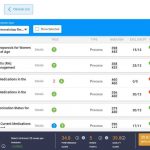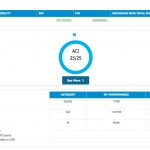This year’s ACR/ARHP Annual Meeting, which takes place Nov. 3–8 in San Diego, features several opportunities to learn more about the ACR’s Rheumatology Informatics System for Effectiveness (RISE) Registry, and the data and tools it offers rheumatologists. For the first time, RISE data will be presented at the Annual Meeting by rheumatologists outside of the ACR’s RISE Research and Publications Subcommittee.
RISE 101
Free to ACR members, RISE was started in 2014 to help providers track and report quality measures under the Physician Quality Reporting System. Today, RISE allows rheumatologists to prepare for and meet reporting requirements under MACRA, the Medicare and CHIP Reauthorization Act of 2015. Those using RISE will report under MACRA’s MIPS pathway, the Merit-Based Incentive Payment System, which bases provider reimbursement on performance in four categories: quality, advancing care information, clinical practice improvement activities and cost.
Since March 2017, the ACR has also accepted requests from physician-scientists, industry researchers and others who wish to use RISE data. To date, about a dozen projects have been accepted, approved or completed.1
“Having some of these projects presented at the Annual Meeting represents a big step forward for the ACR,” says Tracy Johansson, senior specialist, Registry Analytics for the ACR. “It is a valuable opportunity to share with the rheumatology community the potential of RISE data to answer important and pressing clinical questions.”
RISE Data Preview
What follows is a preview of the RISE data to be presented at this fall’s Annual Meeting, and some of the ways in which the registry’s data are being utilized.
Analysis of Provider-to-Provider Variability in the Use of Biologics: Data from the Rheumatology Informatics System for Effectiveness Registry (poster)
On Sunday, Nov. 5, from 9–11 a.m., Doug White, MD, chair of the ACR Committee on Rheumatologic Care, will present data on how he has used RISE to better understand how rheumatologists around the country are using biologics.
“Since biologics are the major driver of the cost of care for rheumatoid arthritis patients, we thought it would be interesting to see the distribution of biologic use on a provider-by-provider basis in the U.S.,” Dr. White says.
Dr. White shows that biologic use across the country is variable according to provider and geographical distribution. “We hope this kind of information can serve as a preliminary benchmark for rheumatologists seeking to compare their practice habits to those of their peers,” he says.
Although the study does not inform the quality of care patients received, Dr. White says he hopes in the future to incorporate reasonable quality measures into a similar study in order to provide rheumatologists with “a benchmark that pertains to value.” He plans to repeat his analysis with 2017 data, particularly because many more providers are utilizing the RISE Registry than in 2016.
Performance on Quality Measures in the RISE Registry and the Merit-Based Incentive Payment System (MIPS) (plenary)
On Sunday, Nov. 5, from 11 a.m.–12 p.m., Jinoos Yazdany, MD, MPH, chair of the ACR’s Research and Publications Subcommittee, will share a brand new dashboard rheumatologists can use to monitor their MIPS performance and compare it against their peers.
“Because of MACRA legislation, the way rheumatologists are paid is fundamentally going to change in the next few years,” Dr. Yazdany says. “We created this MIPS dashboard for rheumatologists so they can estimate where they are in their performance compared to other rheumatology practices, and estimate whether they are going to see positive payments.”
Her plenary session will examine the quality measures available in RISE and help rheumatologists understand average performance on these measures across the Registry. She will also share the final MIPS dashboard prototype and highlight preliminary data to demonstrate what practices are seeing with respect to their MIPS scores.
“It’s an opportunity for people to get a demo of the MIPS dashboard and learn more about how they can use [those] data to succeed,” says Dr. Yazdany.
For example, once MIPS is fully implemented, providers must report six measures in the quality category, and providers would be wise to choose six measures they are confident will assist them in maximizing their scores, Dr. Yazdany says. “If I’m in a practice that’s doing really well meeting the quality measures for rheumatoid arthritis, I might intensively track these particular measures throughout the year through the dashboard to make sure I maintain a high level of performance and fall into a high percentile relative to my peers.”
Large Variations in Tuberculosis Testing for New Biologic Users with Rheumatoid Arthritis Among Providers in the RISE Registry (poster)
On Monday, Nov. 6, from 9–11 a.m., Gabriela Schmajuk, MD, MSc, a rheumatologist researcher based in San Francisco, will present data from the RISE Registry on tuberculosis screening among patients prescribed biologics. It is one of the “key rheumatology-specific quality measures being reported,” Dr. Schmajuk says. “We are seeing a lot of variation in the reporting of this measure, and we think it is largely because quantiferon tests are easy to capture, whereas PPD [purified protein derivative] tests are not.”
In part, Dr. Schmajuk says, PPD tests can be missed by RISE’s quality measure algorithms, because the results are commonly found in physicians’ notes or scanned documents.
“Our study highlights the need to build tools to detect PPDs that are documented in notes or to develop methods for making it easy to put PPD information into a structured field (much like a lab result),” says Dr. Schmajuk. “Studies like ours will highlight areas where improvements like these can be made, so we can make the RISE Registry more useful for participating practices.”
Dr. Schmajuk adds, “This is an exciting time for the RISE Registry, as we are just starting to peek at the data contributed by practices and reported to the Centers for Medicare and Medicaid Services.”
Interested in Using RISE Data?
Those interested in using RISE data should submit a request through the ACR. Requests are considered throughout the year, but there are deadlines for some projects based on major funding application timelines, Ms. Johansson says.
To date, it is estimated that 20% of practicing rheumatologists in the U.S. participate in the RISE Registry, which so far represents more than 1 million rheumatology patients and has collected data on roughly 6.5 million patient encounters.
Reference
- American College of Rheumatology. Projects Using RISE Data. 2017 Sept 5. https://www.rheumatology.org/Portals/0/Files/RISE-Data-Projects.pdf.
Kelly April Tyrrell writes about health, science and health policy. She lives in Madison, Wis.



